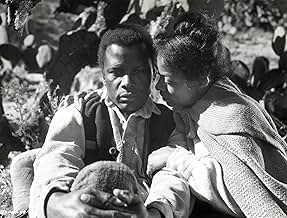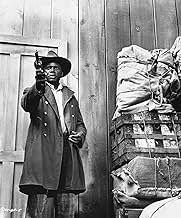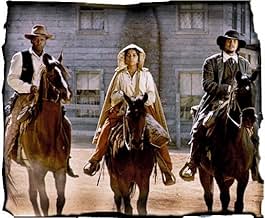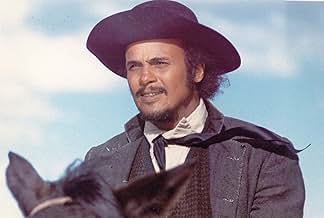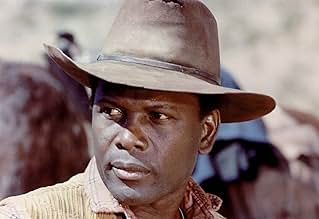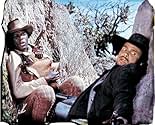IMDb-BEWERTUNG
6,6/10
2972
IHRE BEWERTUNG
Ein Fuhrunternehmer und ein betrügerischer Prediger helfen befreiten Sklaven, die von Billiglohnagenten im Westen verfolgt werden.Ein Fuhrunternehmer und ein betrügerischer Prediger helfen befreiten Sklaven, die von Billiglohnagenten im Westen verfolgt werden.Ein Fuhrunternehmer und ein betrügerischer Prediger helfen befreiten Sklaven, die von Billiglohnagenten im Westen verfolgt werden.
Kenneth Menard
- Little Henry
- (as Ken Menard)
Empfohlene Bewertungen
Poitier plays Buck, one of few blacks who are qualified to be wagonmasters. It is after the Civil War and he is helping escort former slaves into the west. This is not an easy task. They face nature, bounty hunters, racist settlers, robbers, and Indians. The movie is brutally honest with the hatred that these brave men and women faced, but the film has a strong sense of hope. They are not quitters, they raise money workers for sharecroppers along the way. Harry Belafonte has the most colorful role as The Preacher - a reformed thief who befriends Buck when given no one else to trust. The movie is bleak, yet hopeful, well-acted, and exciting. It deserves to be remembered with the best of westerns from that era. Much more historical importance than its predecessor, "Butch Cassidy and the Sundance Kid" with its sappy, happiness and handsome boy wonders. And Poitier rivals George Roy Hill as a director any day. Cool folksy-jazz score. Recommended to anyone who enjoys a fresh, historical angle with their westerns.
This is a fictional movie inspired by how things really were back in the 1800s, in the years following the Civil War and granting slaves their freedom. The white supremacists wanted the black to stay on the farms and work there and would sometimes take drastic, and illegal, means to drive them back.
I found it on a nicely restored version, a Criterion Collection movie from my public library.
Sidney Poitier, who also directed, is Buck, a cowboy who gets paid to lead wagon trains towards their destination. The featured group of migrants are from St. Anne Parish in Louisiana. (While there are many "Saint" parishes in Louisiana, there is no Saint Anne.)
Harry Belafonte, long time Poitier friend, both with Carribean roots and born less than two weeks apart, is Preacher. He travels with a Holy Bible he is quick to display, but as the movie goes on we see that he isn't really a preacher but a rascal that eventually serves a good purpose.
The action of the movie has a band of rogue white supremacists on horses periodically attacking the black migrants, wrecking their wagons, killing some men, all in an attempt to get them to return to their former homes. Buck and the Preacher band together to protect the migrants and get rid of the bad guys.
An entertaining movie, especially for his place in history. As the DVD extras clarifies, the original "cow boys" were black, they were called that to differentiate them from the white "cow hands."
I found it on a nicely restored version, a Criterion Collection movie from my public library.
Sidney Poitier, who also directed, is Buck, a cowboy who gets paid to lead wagon trains towards their destination. The featured group of migrants are from St. Anne Parish in Louisiana. (While there are many "Saint" parishes in Louisiana, there is no Saint Anne.)
Harry Belafonte, long time Poitier friend, both with Carribean roots and born less than two weeks apart, is Preacher. He travels with a Holy Bible he is quick to display, but as the movie goes on we see that he isn't really a preacher but a rascal that eventually serves a good purpose.
The action of the movie has a band of rogue white supremacists on horses periodically attacking the black migrants, wrecking their wagons, killing some men, all in an attempt to get them to return to their former homes. Buck and the Preacher band together to protect the migrants and get rid of the bad guys.
An entertaining movie, especially for his place in history. As the DVD extras clarifies, the original "cow boys" were black, they were called that to differentiate them from the white "cow hands."
I just saw this movie for the first time on Turner Classic Movies tonight. I had heard about it, but missed it. It's just another shoot-'em-up horse opera, but this time with a difference. It's one of the only westerns ever made that is a story about black people in the Old West, with black actors in the lead roles. Harry Belafonte is excellent as the Preacher. Sidney Poitier is also very good, and although the story contains the full compliment of standard cowboy movie clichés---shoot-outs, posse chases, bank robberies, whining ricochet sounds, etc.---, it's very entertaining. The vast majority of Hollywood westerns are exclusively white, and feature virtually no black people at all. Indians are almost always featured as pidgin-speaking cigar-store cartoon characters, with white actors usually in the speaking parts. Some idiot composer came up with the pounding tom-toms, descending minor theme music played by trombones and low brass whenever Indians come into the picture. It's unbelievable how ridiculous this music is. Hollywood has a lot to answer for in its racist treatment of minorities throughout its early history, which has never been fully addressed. So it's great to see a western like Buck and The Preacher that is different. As a result, it's a lot better than your average western, even though it milks the same old clichés.
Buck and the Preacher was the first movie I ever saw about the black experience after the civil war that was centered on their migration west. I've seen this movie three times since it was originally shown, and have enjoyed it as much each time, while Buck, a no-nonsense Wagon Master played by Sidney Poitier takes his responsibilities very seriously. Naive ex-slaves are putting their very lives and fortunes in his hands in their attempt to find the American Dream after slavery. A subtly that many non-blacks do not understand about the relationship of blacks with each other is the historical mistrust and scheming that happens within the culture and still goes on today. That is what makes the meeting of Buck with the Preacher, played by Harry Belafonte Jr. so poignant. They are at opposite ends of the cultural trust scale, but they are forced to team up against a common enemy to secure their individual survival.
The Preacher, shiftless and scheming, and the only stereotypical character in the movie, is very well known to blacks, and not really as funny to blacks as non-blacks may sometimes think.
Buck and the Preacher was one of the first modern movies about black people to provide any depth to the characters, and also to present characters and subject matter that are not normally associated with the black experience. I found it entertaining as well as informative. A well-done move about an often ignored subject.
The Preacher, shiftless and scheming, and the only stereotypical character in the movie, is very well known to blacks, and not really as funny to blacks as non-blacks may sometimes think.
Buck and the Preacher was one of the first modern movies about black people to provide any depth to the characters, and also to present characters and subject matter that are not normally associated with the black experience. I found it entertaining as well as informative. A well-done move about an often ignored subject.
It's shortly after the abolition of slavery and Black people all over the south seek greener pastures where they don't have to be subjected to Jim Crowism. Some would head west with a wagon master showing them the way. And sometimes the greedy white people of the south wouldn't want to let their labor go so they'd send night riders after them to bring them back.
Buck (Sidney Portier) is a wagon master leading a group west. The Preacher (Harry Belafonte) is an opportunistic shuckster who finds himself a part of the Buck-led wagon train. The two of them have to be heroes in a sense in order to get this wagon train west.
I really appreciate this movie being made in the 70's when so many blaxploitation films were made. Instead of pimps, hoes, hustlers, and drug dealers, this movie is about positive black male figures in a western. Besides the terrible movie, "Posse," with Mario Van Peebles, I hadn't seen a Black western. I liked the history this movie presented (however dramatized), what it stood for, and the actors in it. Yes, I have seen better westerns--meaning more entertaining--but I can't readily recall a more significant western.
Buck (Sidney Portier) is a wagon master leading a group west. The Preacher (Harry Belafonte) is an opportunistic shuckster who finds himself a part of the Buck-led wagon train. The two of them have to be heroes in a sense in order to get this wagon train west.
I really appreciate this movie being made in the 70's when so many blaxploitation films were made. Instead of pimps, hoes, hustlers, and drug dealers, this movie is about positive black male figures in a western. Besides the terrible movie, "Posse," with Mario Van Peebles, I hadn't seen a Black western. I liked the history this movie presented (however dramatized), what it stood for, and the actors in it. Yes, I have seen better westerns--meaning more entertaining--but I can't readily recall a more significant western.
Wusstest du schon
- WissenswertesOn the advice of his future wife Joanna Shimkus, Sidney Poitier took over directorial duties from Joseph Sargent when he became dissatisfied with the film's point of view. As a result, this turned out to be Poitier's debut behind the camera and he would go on to direct eight more pictures.
- PatzerWhen Ruth blows out the flame in the lantern, there is a slight delay before the light goes out in the cabin and then another slight delay before the "moonlight" comes up.
- Zitate
Buck: Which way are you ridin', Preacher?
The Preacher: Well, that's not exactly settled in my mind yet.
Buck: Well, you got three possibilities.
The Preacher: Oh?
Buck: North, south or east.
The Preacher: What happened to west?
Buck: We're going west.
- Crazy CreditsOpening credits prologue: The Civil War was over and by law the slaves were freed. But when the promise of land and freedom was not honored, many ex-slaves journeyed out of the land of bondage in search of new frontiers where they could be free at last.
They placed their hopes in the hands of the few black wagonmasters that knew the territories of the West.
None of this came easy, for for not only did they have to overcome a hostile wilderness, but nightriders and bounty hunters were hired by persons unknown to hunt them down and turn them back to the fields.
This picture is dedicated to those men, women and children who lie in graves as unmarked as their place in history.
- VerbindungenFeatured in Dick Cavett Show: Folge vom 1. Mai 1972 (1972)
Top-Auswahl
Melde dich zum Bewerten an und greife auf die Watchlist für personalisierte Empfehlungen zu.
- How long is Buck and the Preacher?Powered by Alexa
Details
Box Office
- Budget
- 2.000.000 $ (geschätzt)
- Weltweiter Bruttoertrag
- 2.762 $
Zu dieser Seite beitragen
Bearbeitung vorschlagen oder fehlenden Inhalt hinzufügen

Oberste Lücke
By what name was Der Weg der Verdammten (1972) officially released in India in English?
Antwort

